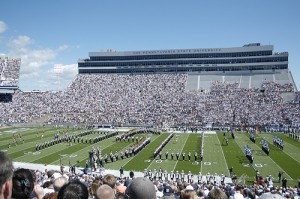It’s hard to understand how profound the Penn State child abuse scandal is unless you live or lived in State College.
Unless you grew up in a town where on Saturdays every living soul was either heading to the game, was already at a tailgate, or was already in their seat in bleachers of Beaver stadium.
Unless every Saturday your family spent together—either meeting up with family friends at a tailgate, eating cheesy, saucy foods in sweaters and Penn State sweatshirts, tossing footballs, goofing around, and looking for players. Checking in about lives, laughing, and talking about how Penn State could win.
Unless you sat in the stands, layered up against the sub zero cold, cheek to cheek with your brother and parents, screaming and yelling and cheering, hair covered with flecks of snow.
Unless you watched the exuberance of the sport, for years, and the community building effect it had on students, children and adults alike. Collective, soul rousing cheers–raising your voice with thousands of people. White outs. The Nittany lion’s endless antics. The shirtless, painted, screaming fans. The thumping band, echoing in your chest. Eating stadium food in all of its salty, unhealthy glory.
Unless one of the first songs you learned as a toddler was Fight on State, and the song is as familiar as Mary had a little lamb.
Unless you grew up beside Joe Paterno’s and Jerry Sandusky’ children. Knew them, went to classes with them, knew Joe’s house, even partied in Sunset park behind it, and kissed a boy in his backyard.
Unless you spent away games dressed in your Penn State clothes, eating tailgate food in your house, gathered around the TV. Mom cheering at the screen, my dad ironing, looking up, eager to find for the score. The landscape of your weekend, the planets in your family constellation.
You really can’t imagine.
The trouble with pedestals is that it is a long fall down. And a community, a university, and a family falls along.
One of the intricacies of youth is the ability to idolize, and place upon a pedestals, our parents, our leaders, our heroes. It is dangerous, reckless, and damaging when we see them fall—when we learn that people aren’t perfect, that indeed people we believe in so much, and have watched for so long, can fail.
It takes your breath away, and leaves you wondering about your own life, your own potential failings, and the indelible and oppressive vulnerability that haunts us all.
I’ve seen this in my life—I know the familiar let down, the hollowness and the sense of becoming unmoored. Growing up, I saw it my one of my coaches, and in my own family. I carry these disappointments deep in my adult self, under layers.
But it doesn’t make it hurt less now.
It only reminds me how fragile this life is and how easily things are taken away– how every single decision we make can change our lives forever.
And none of it really matters, even how my own childhood, the fabric of my upbringing, was centered around this mythic sport and coach. What matters are the relationships, not the vehicles, necessarily, or the traditions that surrounded them.
Because in this instance, what matters most is that children were hurt. They were abused, horribly and irrevocably hurt and victimized and no one stopped it. Not even the one who saw it, or our beloved Joepa.
That is our biggest tragedy.
And no matter who is fired, or how many students turn over cars, or who might pine for the simple glory days of a Penn State youth, it doesn’t change this.
We mourn for the children first, for what they lost. We hope in our hearts for their recovery, for healing, for justice.
Second, our childhood, and our family traditions, have been altered forever, but what remains is what always mattered most. Love of community, family, friends, and sport.
This will rise again in Happy Valley. But yes, we have lost our innocence, and another hero.
image: by acaben on Flickr under CC

